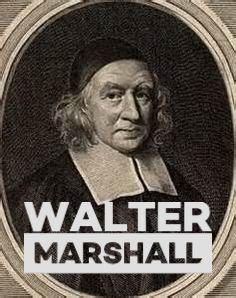“You cannot love God if you are under the continual secret suspicion that he is really your enemy! … You simply cannot love God unless you know and understand how much he loves you. … In the gospel, you can come to know that God truly loves you through Christ. When you have this assurance, you can even love your enemies, because you know that you are reconciled to God. You know that God’s love will make people’s hatred of you work together for your good.” ― Walter Marshall, The Gospel Mystery of Sanctification: Growing in Holiness
Walter Marshall was born in 1628 at Bishops Wearmouth in Durham, England. He was a studious young man who entered Winchester College at eleven. Marshall then went to New College, Oxford, from 1648 to 1657. He earned his B.A. in 1652 and four years later he became the vicar of Hursley, Hampshire, during that time he also served at Winchester College in the areas of teaching, research, and management. Around this time he was married and had two daughters.
In 1662, the Act of Uniformity passed that declared all public prayers, how the sacraments were to be administered and the ordination process of Bishops, Priests, and Deacons within the Church of England must conform to the rites and ceremonies prescribed in the 1662 Book of Common Prayer. Non-conformity would result in serious consequences of removal from the church and the potential of exile, prison, and even death. Marshall did not submit based on his conscience, so he along with many other nonconformists were ejected from their church on the 90th anniversary of the St. Bartholomew’s Day massacre.
Being true to his convictions, Marshall eventually became an Independent congregationalist at Gosport, Hampshire, where he served his remaining days. It was while at Gosport he wrote a book titled Gospel Mystery inspired by 1 Timothy 3:16. Despite having a church and a book that gave him notoriety, Marshall suffered from periods of depression and spiritual difficulties. He interacted with Richard Baxter who saw Marshall as too legalistic. He then went on to meet with Thomas Goodwin, in whom he confided that his sins were constantly weighing on his mind. Goodwin exhorted Marshall because it appeared he had forgotten the Gospel of Jesus Christ who offered the remission of his sins and the sanctifying work of Christ is part of His nature. This helped Marshall with a new vigor to preach and study Christ rather than always looking at himself. In the past, he would often view “personal righteousness [as] the basis of his dealings with God” for some form of peace in his life. This personal revelation resulted in a focus on Christ for holiness, “peace of conscience,” and true joy found in the Holy Spirit. Through this period of challenge and overcoming, he wrote his The Gospel Mystery of Sanctification.
Marshall died at Gosport in 1680. Before he died, he said to his visitors, “I die in the full persuasion of the truth and in the comfort of that doctrine which I have preached to you.” He then offered his last words, “The wages of sin is death; but the gift of God is eternal life through Jesus Christ our Lord” (Rom 6:23).
Walter Marshall did not gain recognition for his preaching, but his writings and the way he lived commended him to others. He taught that union with Christ and combining the means of grace will result in a “fruitful and blessed life. Such a pursuit will abase our flesh, exalt God, and coalesce with all the doctrines of grace.” (Joel Beeke).

